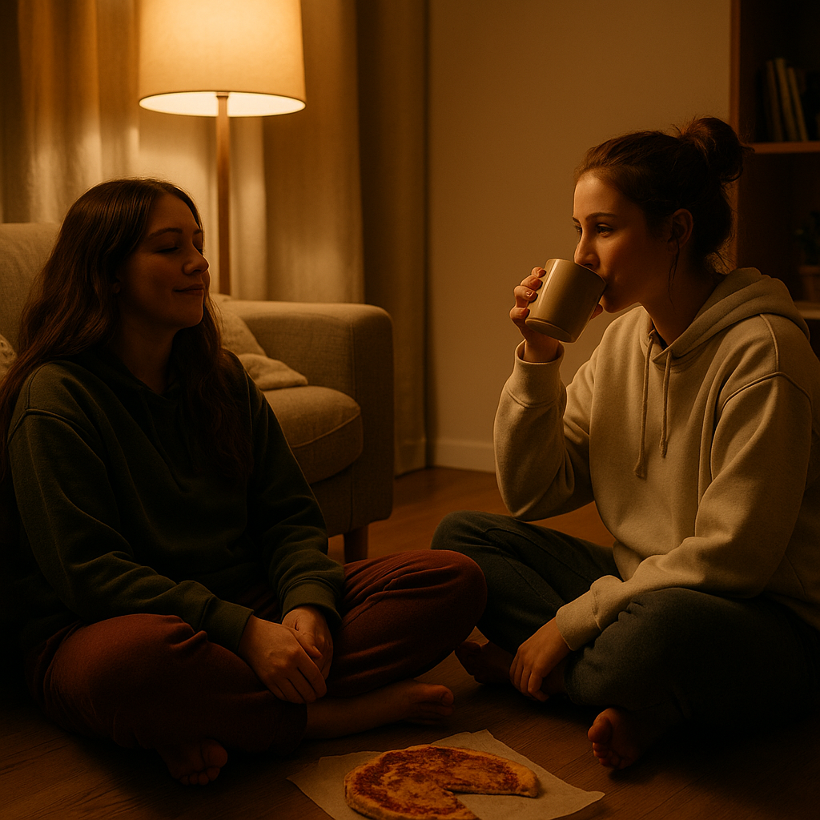
We Didn’t Do Much, But I Felt Different After
There are days when the world feels heavy, when conversation is too much, but silence feels too lonely.
You’re not looking to open up. You’re not trying to fix anything. You just need someone nearby. Not to advise or impress you.
Just to exist beside you.
In a culture obsessed with doing more, there’s quiet magic in doing nothing together and realizing it meant everything.

When “Just Hanging Out” Heals Something Deeper
It was one of those ordinary evenings. Two friends. A couch. A half-hearted scroll through Netflix.
They debated pizza toppings (yes to pineapple, no to olives), then scrolled their phones in companionable silence. The show barely held their attention. But it didn’t matter. The comfort wasn’t in the content. It was in the company. And when one friend left hours later, she felt lighter.
No problems solved, but something had shifted.
The Science of Just Being There
Human beings are wired for co-regulation. Being near someone who makes you feel safe without saying a word can ease stress and settle the nervous system. Even subtle presence, like sitting close or sharing space quietly, lowers cortisol levels and promotes calm.[1]
A landmark study showed that holding the hand of someone you trust during a stressful experience can reduce the brain’s fear response.[2]
We often think healing requires deep talks or catharsis.
But sometimes it’s just about being near someone who doesn’t expect anything from you.

No rush. No performance. Just quiet company. The kind of evening that recalibrates the soul.
A Visit That Changed Everything (Without Saying So)
A young woman once told me about a rough month she had after moving to Calgary. New job, too much rain, and a loneliness that crept in slowly.
One Saturday, her older brother came to visit. They ran a few errands. Folded laundry.
Watched a baseball game with the volume low while debating if pineapple belongs on pizza (she insisted it does).
There were no deep conversations. No breakthroughs.
But after he left, she felt unexpectedly emotional.
“We didn’t even talk about what I was going through,” she said.
“But I felt like I could breathe again.”
That’s the power of presence without pressure.
Why It Works (Even When It Doesn’t Look Like Much)
There’s something disarming about low-stakes time with people who accept you exactly as you are.
You don’t need to be interesting.
Or cheerful.
Or articulate.
You can show up in sweatpants, say nothing, and still feel loved.
As writer Dinah Craik put it:
“Oh, the comfort, the inexpressible comfort of feeling safe with a person, not having to weigh thoughts nor measure words.”[3]
In these spaces, healing happens quietly without ceremony and noise.
7 Ways to Invite Quiet Connection
If you’ve been feeling off but not ready for big social energy, try one of these gentle, presence-based hangouts:
Send the “no plans, just come over” text. Let go of the need for an agenda.
Watch something nostalgic. Comfort TV is underrated therapy.
Make food together. Even if it’s just grilled cheese or frozen pizza.
Share a quiet task. Fold laundry. Water plants. Organize drawers. Together.
Take a slow walk. Don’t talk unless you want to. Let silence be the soundtrack.
Sit in the same space doing your own thing. Co-reading. Parallel scrolling.
Try a digital-free hour. Put phones away and let the quiet stretch.
These aren’t revolutionary. But they don’t need to be.
They’re soft places to land when everything else feels sharp.
Slowness Isn’t Laziness
We’re conditioned to think we need to earn rest.
To make every moment count.
To constantly produce something.
But emotional wellness often hides in the moments that don’t look like anything.
The rainy afternoon.
The wordless movie night.
The snack break that turns into two hours of easy company.
These are not wasted hours.
They are gentle recalibrations.
You Don’t Have to Do Much to Matter
So if you’ve been wondering whether you’re being a good friend...
Or if you’re showing up enough...
Remember this:
Your presence matters.
Even your quiet, tired, no-words-needed presence.
Being near someone, with no expectation to perform or entertain, is one of the most powerful gifts you can give.
Sometimes, you don’t need to be the hero.
You just need to be There!
Sources
1. Virginia News – Research on emotional regulation through presence
2. Coan, Schaefer & Davidson (2006) – Handholding and neural response to threat
3. Dinah Craik – A Life for a Life